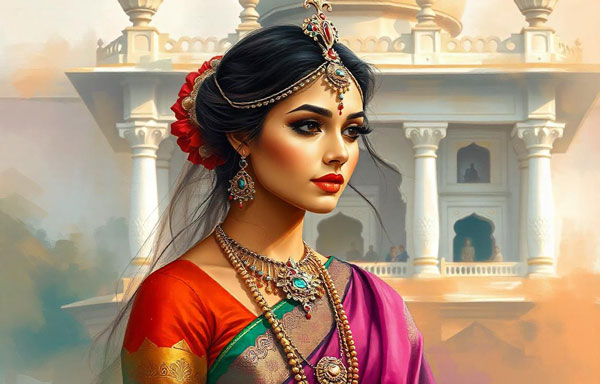Tale of Champapur and its princess, Tribhuvan-sundari
Immerse yourself in the legend of Champapur, where beauty, strength, and knowledge lead to a royal decision. Find out who is the chosen one.
Princess Tribhuvan-sundari
The 7th Tale of Betal Pachisi
The spirit said, "O king! there is a city named Champapur, the king of which is Champakeshwar. And the queen's name is Sulochana, and the daughter's Tribhuvan-sundari. She is an eminently-beautiful woman, whose face is like the moon, hair like black clouds, eyes like a gazelle's, eyebrows (arched) like a bow, nose like a parrot's (beak), neck like a pigeon's, teeth like the grains of a pomegranate; the redness of whose lips resembles that of the kanduri,1 whose waist is like a leopard's, hands and feet like the tender lotus, complexion like the champa-flower; in short, the bloom of her youth was daily on the increase."

"When she became marriageable, the king and queen began to feel anxious in their minds. And the news spread among the monarchs of the different countries (round about) that so beautiful a girl had been born in the palace of king Champakeshwar that, at a mere glance at her beauty, gods, men, and holy sages, remain fascinated. Thereupon the kings of the different countries had each his likeness painted, and sent it by the hands of a Brahman to king Champakeshwar.
"The king received and showed the portraits of all the monarchs to his daughter, but none of them suited her fancy. Thereupon the king said, 'Do thou, then, make a public choice of a husband.' To this, too, she did not agree, but said to her father, 'Father! give me to him who possesses the three qualities of beauty, strength, and superior knowledge.'"
"In fine, when several days had elapsed, four suitors came from four different countries. Then the king said to them, 'Do each of you set forth clearly before me the superior qualities and knowledge he possesses.' One of them said, 'I possess such knowledge that I manufacture a cloth and sell it for five rubies. When I realise the price, I give one of the rubies to Brahmans, of another I make an offering to the gods, a third I wear on my own person, a fourth I reserve for my wife, the fifth I sell, and constantly support myself with the money so obtained. No one else possesses this knowledge. And as to the good looks I possess,—they are open to view.' The second said, 'I am acquainted with the languages of both land and aquatic beasts and birds; have no equal in strength; and my beauty is before you.' The third said, 'So well do I comprehend the learned writings that no equal of mine exists; and my beauty is before your eyes.' The fourth said, 'I stand alone in my knowledge of the use of weapons;2 there is no one like me; I can shoot an arrow which will strike an object which is heard, but not seen; and my beauty is famous in the world,—you, too, must surely see it.'"
"On hearing the statements of the four of them, the king began to think to himself, 'All four are on a par as to excellences; to which should I give the girl?' Having reflected thus, he went to his daughter and set forth the virtues of the whole four of them, and said, 'To which of them shall I give thee (in marriage)?' On hearing this, she hung down her head through modesty, and kept silent, making no answer."
After relating so much of the story, the spirit said, "Now, King Vikram! for which of them is this woman suited?" The king replied, "He who makes cloth and sells it is a sudra by caste; and he who knows the languages is a bais by caste; he who has studied the learned writings is a Brahman; and he who hits with an arrow an object which is simply, heard, and not seen, is of her caste: the woman is suitable for him." On hearing these words, the spirit went again and hung himself on that tree; and the king, too, went thither, bound him, placed him on his shoulder, and carried him off.

Friendship Day
Friendship Day Greeting Cards
Friendship Day Quotes
Horror stories
Moral Stories
Fairy Tales and Fables
Upanishads
Classic Stories
Betal Pachisi
Singhasan Battisi
Indian Mythology stories
School Projects
Quiz on Famous Footballers
Benefits of Yoga for Kids
Congratulations Cards and Messages
 Change Language:
Change Language:
Try out the other sections

 Parents' Day
Parents' Day Craft Ideas for Kids
Craft Ideas for Kids Benefits of Yoga for Kids
Benefits of Yoga for Kids School Projects & Homework Help
School Projects & Homework Help